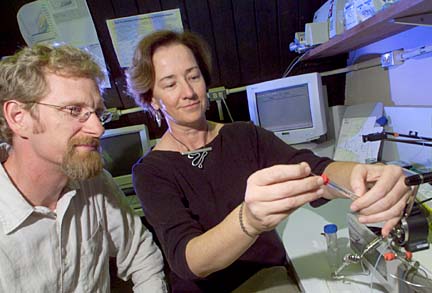


|
2 UH researchers Two University of Hawaii researchers doing landmark studies on the bobtail squid and a light-emitting bacterium to understand chronic diseases in humans have been elected to prestigious Fellowships in the American Academy of Microbiology.
elected to fellowships
for squid study
Their research aims to learn
more about human illnessesBy Helen Altonn
haltonn@starbulletin.comMargaret McFall-Ngai and Edward Ruby of the Pacific Biomedical Research Center have been developing a system using squid to study how benign bacteria interact with animals.
McFall-Ngai, professor of biology, and Ruby, professor of bacteriology, are collaborating with colleagues at the University of Iowa under a $2 million W.M. Keck Foundation grant.
Working with the squid and luminescent bacteria, Vibrio fischeri, the group is trying to determine the difference between a bacterium that lives with an animal and helps its health and one that causes sickness.
The American Academy of Microbiology honored the UH scientists for developing "an important model in studying the intimate relationships between microbes and their animal hosts."
Andrea Lohse of the academy said election to the Fellowships is very selective and it's remarkable that the closely collaborating UH scientists were elected at the same time, each recognized for individual achievements.
"It usually doesn't happen that way," she said.
Although McFall-Ngai isn't a traditional microbiologist, her work is having a significant impact in the field, the academy said. It said her research "has shed new light on critical questions and concepts in microbiology-like symbiotic relationships, beneficial bacteria and a variety of processes involved in infection."
Ruby, a specialist on the microbial/molecular aspects of the squid/bacteria interaction, was recognized for bridging the sciences of microbiology, animal development and animal ecology.
"He has established the molecular basis of bacterial-based light organ development in marine animals," the academy said.
McFall-Ngai and Ruby have been studying the squid since 1989, when they were University of Southern California faculty members.
They joined the UH faculty in 1996, continuing their research at the Pacific Biomedical Research Center's Kewalo Laboratory.
They are among only 1,700 scientists elected to honorary Fellowships in the 47-year history of the American Academy of Microbiology.
University of Hawaii